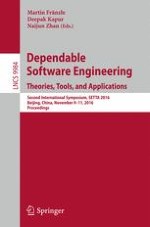2016 | OriginalPaper | Buchkapitel
Semipositivity in Separation Logic with Two Variables
verfasst von : Zhilin Wu
Erschienen in: Dependable Software Engineering: Theories, Tools, and Applications
Aktivieren Sie unsere intelligente Suche, um passende Fachinhalte oder Patente zu finden.
Wählen Sie Textabschnitte aus um mit Künstlicher Intelligenz passenden Patente zu finden. powered by
Markieren Sie Textabschnitte, um KI-gestützt weitere passende Inhalte zu finden. powered by
